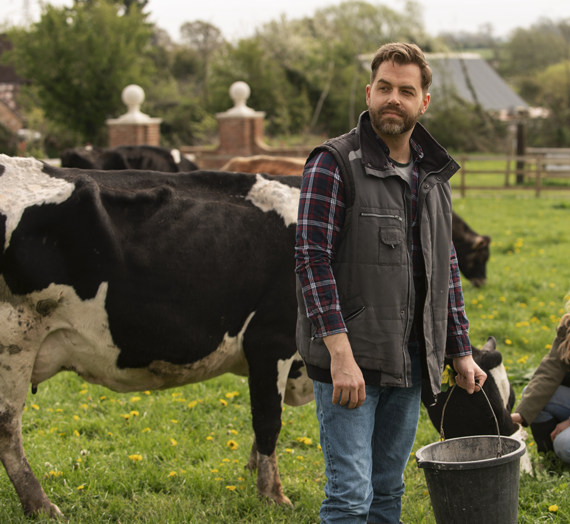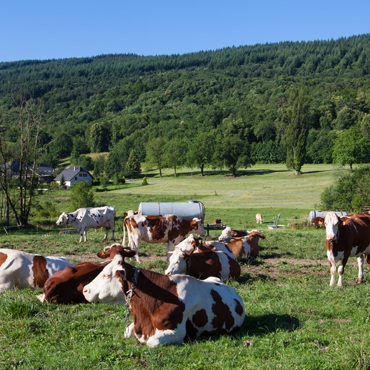Animal Husbandry

RG environmental
Animal Husbandry
At RG environmental, our animal husbandry services are designed to enhance the productivity and welfare of livestock while promoting sustainable farming practices. We offer comprehensive support in breeding, nutrition, and health management, tailored to meet the unique needs of each species. Our team of experts provides guidance on best practices, from optimizing feed formulations to implementing effective disease prevention strategies. We prioritize animal welfare and adhere to the highest ethical standards, ensuring that our livestock not only thrive but also contribute positively to the agricultural ecosystem. By leveraging innovative technologies and sustainable methods, we aim to empower farmers to achieve greater efficiency and profitability in their operations. In addition to our core services, we also provide ongoing education and resources to help farmers stay informed about the latest advancements in animal husbandry. Our workshops and training sessions focus on practical skills and knowledge that enable producers to make informed decisions for their operations. We believe in building strong partnerships with farmers, fostering a collaborative environment where shared insights and experiences lead to improved practices.
Benefits of Animal Husbandry
Increased Productivity
Implementing effective animal husbandry practices leads to higher livestock yields, including meat, milk, and eggs, maximizing overall production. Additionally, these practices promote environmental sustainability and enhance the resilience of livestock systems.
Improved Animal Health
With a focus on health management and disease prevention, animal husbandry helps reduce the incidence of illnesses, leading to healthier livestock and lower veterinary costs. This proactive approach not only improves animal welfare but also boosts overall productivity.
Better Animal Welfare
Prioritizing animal welfare fosters humane treatment practices, improving the quality of life for livestock and enhancing the overall reputation of the farming industry. Furthermore, this commitment to welfare can attract conscious consumers who value ethically sourced products.
Community Engagement
Animal husbandry practices encourage collaboration and knowledge sharing among farmers, strengthening community ties and support networks.This collective effort not only enhances overall productivity but also fosters innovation.
Diversification of Income
Animal husbandry allows farmers to diversify income streams by producing various products, reducing reliance on a single crop or market. This diversification helps mitigate financial risks and enhances economic stability for farming operations.
Economic Growth
A well managed animal husbandry operation can drive economic benefits for farmers and communities, creating jobs and supporting local economies. Additionally, it can promote sustainable practices that ensure long-term viability for future generations.
RG environmental
Through responsible animal husbandry, we nourish the land, support communities, and cultivate a brighter tomorrow
Contact UsRG environmental
Animal Husbandry

Understanding Animal Husbandry
Understanding animal husbandry is crucial for optimizing livestock production and ensuring the welfare of animals within agricultural systems. At RG environmental, we emphasize the importance of this foundational knowledge, which encompasses the science and art of breeding, feeding, and managing animals effectively. Animal husbandry involves a comprehensive understanding of each species’ specific needs, including their nutritional requirements, behavioral traits, and health considerations. By integrating this knowledge into our services, we help farmers implement best practices that enhance productivity while promoting ethical treatment and environmental sustainability. Our expert team provides insights into advanced breeding techniques, effective feeding strategies, and robust health management protocols that collectively contribute to healthier animals and improved yields. Furthermore, understanding animal husbandry allows for the effective use of innovative technologies, such as precision farming tools and data analytics, which can optimize operations and drive efficiency.

Nutrition and Feeding
Nutrition and feeding are vital components of successful animal husbandry, significantly impacting the health, growth, and overall productivity of livestock. At RG environmental, we recognize that each species and even individual animals have unique dietary requirements that must be met to optimize their performance and well being. Our comprehensive approach begins with assessing the nutritional needs based on age, weight, and production goals, allowing us to formulate balanced diets that include the right mix of proteins, carbohydrates, vitamins, and minerals. We work closely with farmers to design customized feeding programs that not only enhance growth rates and reproductive performance but also improve feed efficiency, ultimately reducing costs and increasing profitability. Additionally, we emphasize the importance of high quality feed sources and innovative feeding techniques, such as the use of supplements and additives that promote digestive health and immune function. By providing ongoing education and resources, we empower farmers to stay informed about the latest advancements in animal nutrition.

Breeding and Genetics
Breeding and genetics are cornerstone elements of our animal husbandry services at RG environmental, playing a crucial role in enhancing livestock productivity and resilience. We understand that the genetic potential of animals significantly influences traits such as growth rate, reproductive efficiency, disease resistance, and overall performance. Our team of experts employs advanced breeding techniques, including selective breeding and artificial insemination, to help farmers improve the quality and productivity of their herds. We prioritize the careful selection of breeding stock based on desirable genetic traits, ensuring that each generation demonstrates improved performance and adaptability to changing environmental conditions. Additionally, we provide valuable insights into genomic selection, which allows for more precise breeding decisions by utilizing genetic data to identify superior animals. This scientific approach not only accelerates genetic progress but also helps reduce the risk of hereditary diseases within livestock populations.

Innovations in Animal Husbandry
Innovations in animal husbandry are transforming the agricultural landscape, and at RG environmental, we are committed to integrating cutting edge technologies and practices that enhance livestock management and productivity. We leverage advancements such as precision farming, which utilizes data analytics and IoT (Internet of Things) devices to monitor animal health, nutrition, and environmental conditions in real time. This allows farmers to make informed decisions that optimize care and resource use, ultimately leading to improved animal welfare and operational efficiency. Additionally, we are exploring the use of biotechnology, including genetic editing and advanced breeding techniques, to develop livestock that are more resilient to diseases and adaptable to climate change. Our services also incorporate sustainable practices, such as regenerative agriculture and integrated pest management, which minimize environmental impact while maximizing productivity.We ensure that our clients are equipped with the latest knowledge.

Controls Hydrogen Sulphide and Ammonia
Controlling hydrogen sulfide and ammonia levels is essential for maintaining a healthy environment in animal husbandry, and at RG environmental, we prioritize effective management strategies to mitigate these harmful gases. High concentrations of hydrogen sulfide, often generated from decomposing organic matter, pose serious health risks to both livestock and workers. Similarly, ammonia, a byproduct of nitrogenous waste, can lead to respiratory issues and other health problems if not properly managed. Our comprehensive approach includes implementing proper ventilation systems, regular waste management practices, and innovative technologies such as biofilters and chemical scrubbers that effectively reduce gas concentrations in animal housing facilities. Additionally, we educate farmers on the importance of maintaining optimal bedding and hygiene practices, which can significantly lower ammonia emissions. By addressing these environmental challenges, we not only enhance the welfare of the animals but also create safer working conditions for farm employees, ultimately promoting a more sustainable and productive agricultural operation.
